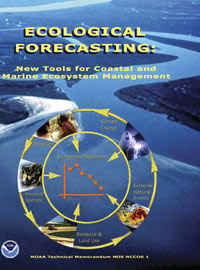Ecological Forecasts
 Ecological Forecasts give managers the tools to answer 'what-if' questions about the ocean and coastal environments. These environments provide a broad range of services, both ecological and economic. They are "home" to an incredible number and variety of marine and estuarine organisms. These environments also play a significant role in supporting our economy, due to tourism, use as a transportation system for goods and services, fishing, and many other water dependent functions. Many of these uses, however, can be in conflict or in competition due to adverse consequences of some activities impairing other uses.
Ecological Forecasts give managers the tools to answer 'what-if' questions about the ocean and coastal environments. These environments provide a broad range of services, both ecological and economic. They are "home" to an incredible number and variety of marine and estuarine organisms. These environments also play a significant role in supporting our economy, due to tourism, use as a transportation system for goods and services, fishing, and many other water dependent functions. Many of these uses, however, can be in conflict or in competition due to adverse consequences of some activities impairing other uses.
For instance, tourism depends upon healthy coastal environments to attract visitors. Being able to predict the consequences of different activities on the ocean and coastal environments provides decision-makers with strong justification for taking specific actions that balance the multiple demands on these environments.
The concept of Ecological Forecasts brings together wide-ranging research and observations. It is a new and challenging science, focusing on projecting conditions that may harm coastal environments and resources. It integrates physical, chemical, biological, economic, and social data about the present condition of the coastal environment and predicts future conditions, based upon different management strategies.
These forecasts allow managers to decide what future conditions are acceptable to society and to take appropriate actions to effect those conditions. These forecasts are the bridge between research science and governmental policy.
Forecast success depends on partnerships at all levels - universities, local and state governments, and other Federal agencies. Strong partnerships help decision-makers identify what is needed to develop the Forecasts and support the capability to respond to those needs. The resulting Forecasts help scientists and resource managers better manage our Nation's coastal resources.
These Forecasts produce social and economic benefits. However, they may have undesirable results if they are imprecise, incorrect, or inappropriately distributed. For example, a red tide forecast can reduce monitoring costs and may have public health benefits.
However, if the forecast is released before coastal managers are prepared, or if it is inaccurate in its landfall prediction, it can have adverse consequences. Therefore, it is critical that ecological forecasts include the uncertainty associated with it so that managers can appropriately adjust their decisions.
Links
NCCOS' Center for Sponsored Coastal Ocean Research (CSCOR) leads the development of predictive, multi-disciplinary coastal ecosystem research to support sound management decisions. Ecological forecasting is a driving force in all of CSCOR's current research programs. (more)



